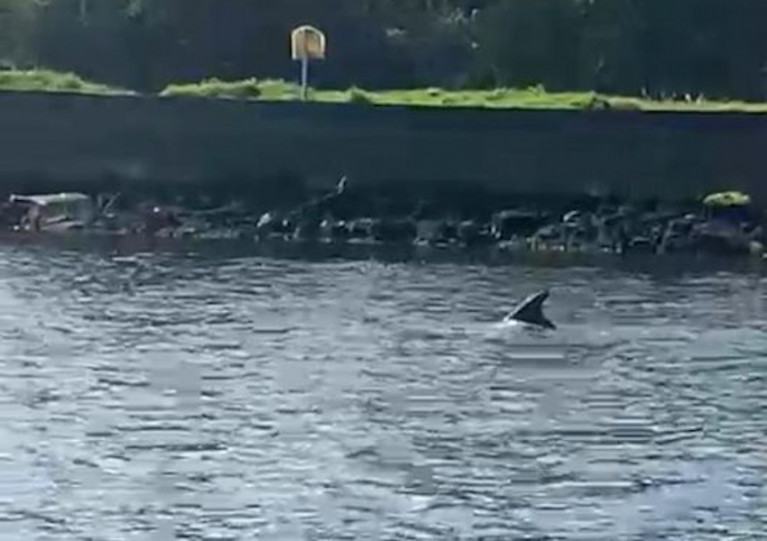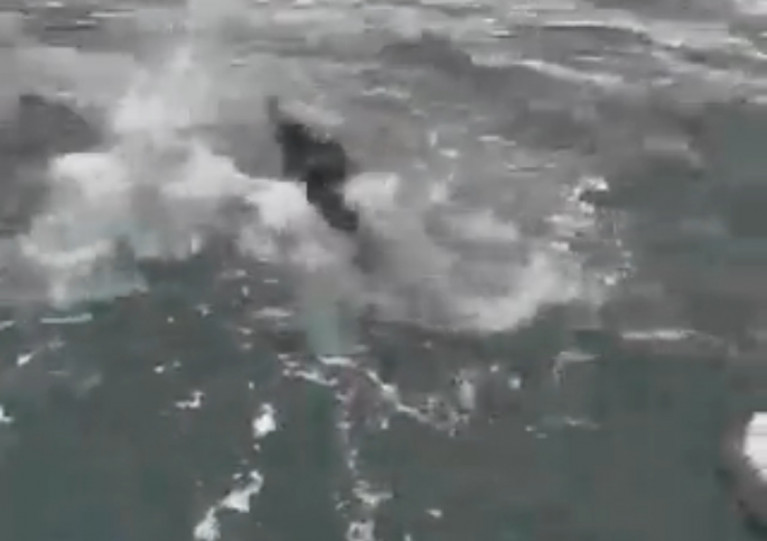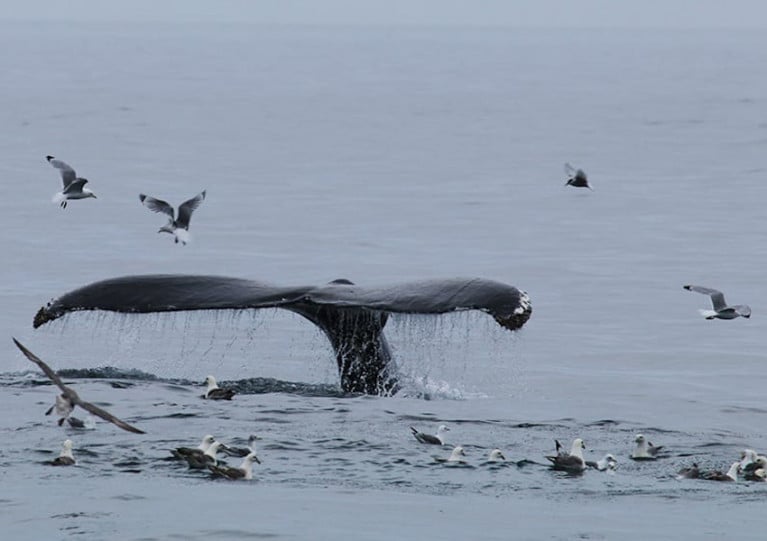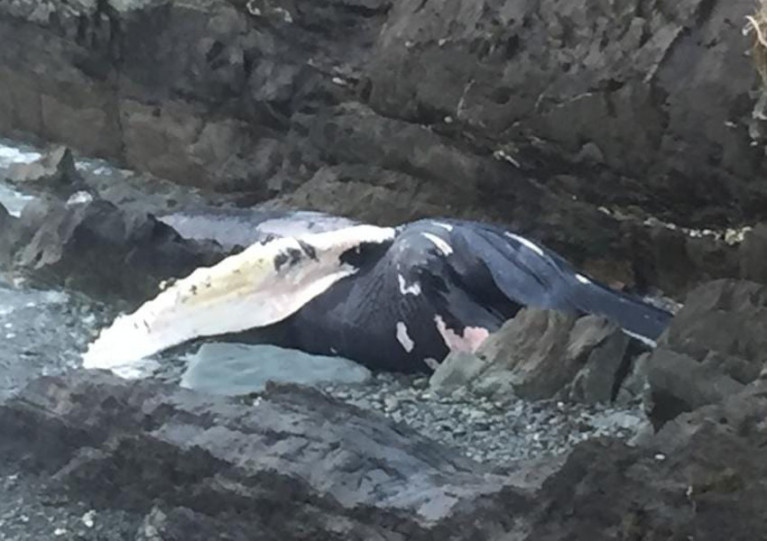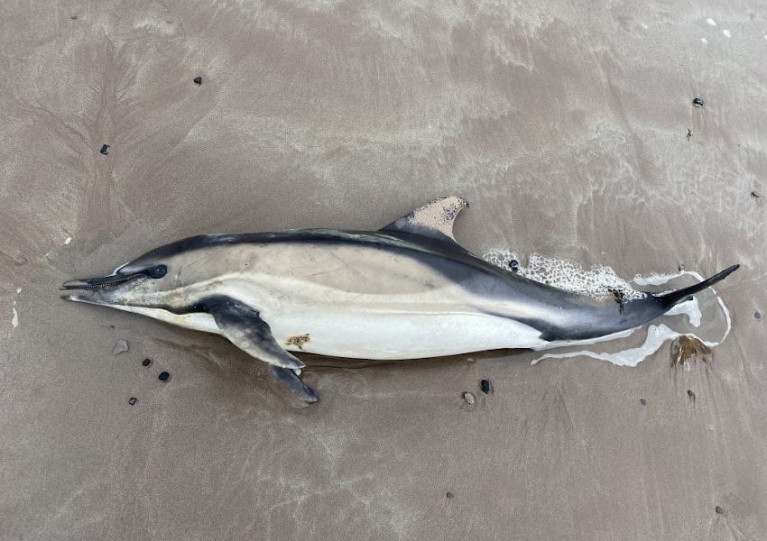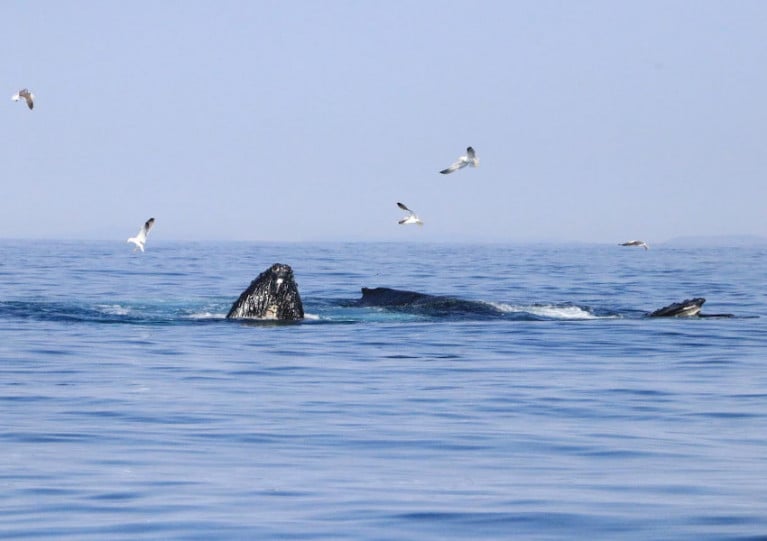Displaying items by tag: IWDG
Online Petition Calls on TDs to Support Legal Protection for Basking Sharks in Ireland
More than 2,000 people have already signed an online petition in support of legal protection for basking sharks in Irish waters.
The appeal was started by Simon Berrow of the Irish Whale and Dolphin Group to encourage TDs to support The Wildlife (Amendment) Bill 2021 tabled last week by Social Democrats TD Jennifer Whitmore.
As previously reported on Afloat.ie, the bill would make it illegal for anyone to intentionally or recklessly injure, disturb or harass the second-largest fish in the world’s oceans.
While basking sharks are an endangered species, they are currently not afforded the same protections in law as whales, dolphins, porpoise and seals in Irish waters.
Berrow says: "Ireland and our coastal communities have historically benefited from basking shark fisheries and today we have a duty to provide protection for this highly mobile species when they occupy Irish territorial waters."
He adds: "Adding the species to Schedule Five of the Wildlife Act (1976) as amended is the simplest method to provide protection for the species in Irish territorial waters."
Offshore renewables must not be pursued at the cost of Ireland’s biodiversity, an Oireachtas committee has been told.
According to The Irish Times, members of the Oireachtas Committee on Climate Change heard statements from various environmental and conservation groups who explained how Ireland’s waters and coastal areas are under threat from the effects of climate change as well as pollution and invasive species.
Ellen MacMahon of the Sustainable Water Network noted the important role of wind energy in decarbonising the Irish economy.
But she added that “marine protected areas are often overlooked in the role they can play in addressing the twin climate and biodiversity emergencies”.
Her comments were echoed by Dr Simon Berrow of the Irish Whale and Dolphin Group, who said offshore wind farms “cannot be considered in isolation” from their immediate environments and urged that such green energy projects are “not at further cost to Ireland’s already depleted marine habitats and species”.
The Irish Times has much more on the story HERE.
West Cork is enjoying a veritable bounty of whale sightings “in dolphin numbers”, as the Southern Star reports.
Video recorded last week near Union Hall shows two humpbacks who followed a whale watching vessel “in a very sociable mood”, according to Cork Whale Watch’s Colin Barnes.
He descried it as the best marine wildlife sighting of its kind in the last two decades — a sentiment echoed by the Irish Whale and Dolphin Group’s Padraig Whooley.
Noting a recent report of as many as 100 minke whales spotted on a single boat trip, Whooley said the whale activity off the South Coast at present is “exceptional on a global scale”.
The Southern Star has more on the story HERE.
Dolphin in River Boyne Excites Drogheda Locals
The Irish Independent covers the excitement among the denizens of Drogheda after a dolphin swimming up the River Boyne paid an unexpected visit to the town.
Reports of a dog in the water yesterday morning (Thursday 22 April) turned out to be wide of the mark when Boyne Fishermen Rescue and Recovery encountered the “medium-sized dolphin” in the River Boyne at the Upper Mell slipway, just east of the town centre and some 7km from the open sea.
The Irish Whale and Dolphin Group says the marine wildlife is likely to be a bottlenose and called for the public to contact it with any images or reports of further sighings.
While there is no immediate cause for concern, dolphins are saltwater animals and can develop serious kidney and skin problems with prolonged exposure to freshwater environments.
The Irish Whale and Dolphin Group (IWDG) has said it is “irresponsible to raise peoples' hopes” that a dolphin spotted off West Cork in recent days might be Dingle’s missing resident bottlenose, Fungie.
Cork Beo reported on Sunday (11 April) on video recorded off the Old Head of Kinsale of a playful solitary dolphin which has sparked optimism that Fungie has reappeared some six months since he vanished from Dingle Harbour, his home since 1983.
But the IWDG has moved to play down such hopes, reminding that bottlenose dolphins like Fungie “are abundant and widespread throughout Irish coastal waters”.
It added: “While the IWDG are surprised at this individual’s behaviour around the boat it was recently filmed from, it is way too early to speculate that this dolphin is Fungie.
“The IWDG have validated 13 sightings of bottlenose dolphins off the Irish coast already this month (April) from Co Kerry to Co Louth.”
The group is awaiting clearer images of the dolphin’s tail fluke or dorsal fin before it makes any confirmed identification.
“The IWDG feel it is irresponsible to raise peoples’ hopes that this might indeed be Fungie, while current evidence merely shows it to be a bottlenose dolphin behaving in an unexpected fashion,” it said.
It’s not the first video of a frolicking dolphin to cause a stir in recent weeks, as footage captured in Galway Bay last month raised hopes that Fungie had relocated along the West Coast.
Viewers in Ireland have another chance to catch a fascinating documentary on a unique expedition to the Arctic Circle tracing the origins of Ireland’s annual humpback whale visitors.
Broadcast yesterday evening on RTÉ One, Ireland to Iceland - On the Trail of the Humpback Whale follows marine wildlife researchers and volunteers with the Irish Whale and Dolphin Group (IWDG) on their weeks-long passage to Ireland in search of humpback whales in 2018.
As previously reported on Afloat.ie, Tony Whelan’s film also charts the links that the Irish crew made with Iceland and the costal communities they met along the way.
Now the film is available to watch for 30 days for viewers in the Republic of Ireland on the RTÉ Player.
Public Warned to Stay Away from West Cork Whale Carcass
The Irish Whale and Dolphin Group (IWDG) has warned the public to stay away from the final resting place of a humpback whale carcass that washed ashore in West Cork last month.
And according to the Southern Star, poor weather forecast for later this week has dampened hopes to potentially retrieve the marine wildlife remains for public display.
The carcass of the juvenile humpback whale is only the ninth recorded stranding of the species in Ireland, as previously reported on Afloat.ie.
First spotted in the waters of Roaringwater Bay, it eventually came to rest on the rocky shore at the foot of steep bank at Colla West near Schull, where IWDG volunteers have examined the remains over the weeks since.
Plans had been mooted to preserve the skeleton as a potential tourism draw for the area, the IWDG’s Pádraig Whooley said, though this would be “at great expense”.
“Although the plan was tentative, if successful, it would be a wonderful opportunity because the only other humpback whale on display is in the Natural History Museum, and that dates back to 1893,” he added.
The Southern Star has more on the story HERE.
Irish Whale & Dolphin Group to Provide Marine Mammal Observer on Upcoming Fisheries Surveys
The Irish Whale and Dolphin Group (IWDG) won the tender to provide a marine mammal observer on three fisheries acoustic surveys with the Marine Institute this year.
These include a survey for blue whiting this month, the Western European Shelf Pelagic Acoustic (WESPAS) survey during June and July and the Celtic Sea Herring Acoustic Survey in October.
The aforementioned missions are annual stock assessment surveys and cover a huge area of the Irish EEZ.
Data on higher trophic predators such as marine mammals and seabirds are essential to provide the data to support the development of an ecosystem approach to fisheries management.
Experienced offshore surveyor Dr Justin Judge will be joining each cruise to record all sightings of whales and dolphins and other interesting endangered, threatened and protected (ETP) species, as well as recording the vessels’ track and environmental conditions.
He follows in the footsteps of Dave Wall, who used data collected from these annual surveys in 2014 to built the dataset to publish the first Offshore Atlas of Marine Mammal Distribution.
Whale & Dolphin Strandings Reach New Peak With 93 Recorded in First Two Months of 2021
Whale and dolphin strandings in Ireland for the first two months of 2021 have reached their highest peak yet with 93 records, as the Irish Whale and Dolphin Group (IWDG) reports.
The bulk of these marine wildlife findings were common dolphins, with 64 in total discovered around the Irish coast since the beginning of the year.
“Although historically the IWDG have identified January to March as a peak stranding period for common dolphins, 2021 figures are already proving to be quite high compared to the same period in previous years,” says IWDG sightings officer Stephanie Levesque.
“This time last year, IWDG had received 70 records in total, of which 40 were common dolphins.”
The total figure comprises eight species: common, bottlenose, striped and Risso’s dolphins, harbour porpoise, long-finned pilot whale, minke whale and one rare record of a humpback whale, as previously reported on Afloat.ie.
Levesque adds: “There are most likely several factors affecting this increase in reported strandings, and although we are not sure exactly what is causing it, a number of factors must be taken into account.
“As the entire country found itself in lockdown, and was spending significantly more time walking the local shores during the peak stranding period, there was bound to be more reporting taking place.”
In addition, Levesque reports that the IWDG has had a high social media reach in recent months “and perhaps more people are inclined to report these strandings”.
There is also “increasing evidence of a broad-scale movement of common dolphins from deep offshore waters into shelf edge waters” within the North-East Atlantic.
“IWDG sightings officer Pádraig Whooley has noted more common dolphin sightings reported off the coast of Ireland this winter, and where you have more dolphins, it likely leads to more strandings,” Levesque adds.
Nearly one in 10 (9%) of recorded strandings between 1 January and 28 February have “gross signs of bycatch in rising gear” such as broken jaws, cut-off tails and dorsal fin tips, and being entangled in fishing gear.
“This is likely to be a minimum as diagnosing bycatch can be quite difficult if the lesions are more subtle, or drowning has taken place with no external lesions,” Levesque says.
The Irish Whale and Dolphin Group (IWDG) says it welcomes the new public consultation on expanding Ireland’s Marine Protected Areas.
As previously reported on Afloat.ie, the Government is aiming to have 30% of Ireland’s maritime area designated as Marine Protected Areas (MPAs) by 2030.
Current coverage is just 2.13%, the IWDG says, adding that there is at present no definition of an MPA in Irish law.
“We wish to see Ireland achieve their international commitments and legal obligations, and create a truly ecologically coherent network of well-managed and well resourced MPAs, that is representative and connected,” says Sibéal Regan, the IWDG’s Education and Outreach Officer.
“In that case, it must be defined and underpinned by the appropriate legislation.”
It’s also hoped that expanding Ireland’s designated conservation areas for marine wildlife will protect core habitats from encroachment by human activity such as fishing.
Research commissioned by the IWDG has identified a number of hotspots for dolphins, porpoise and whales within Ireland’s 12-nautical-mile limit.
These have informed the group’s recommendations for potential MPA sites around the coast, available on the IWDG website here.


























